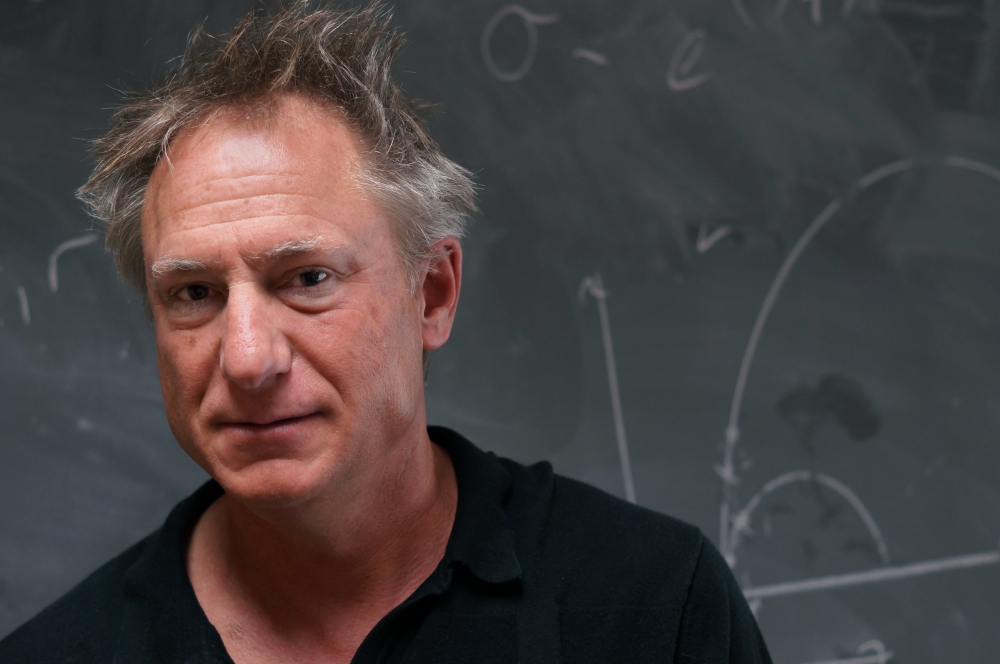Physics Professor Receives the 2015 Buckley Prize

Matthew Fisher, a professor of physics at UC Santa Barbara, has been awarded the 2015 Oliver E. Buckley Prize for discovery and pioneering investigations of the superconductor-insulator transition, a paradigm for quantum phase transitions.
The Buckley Prize is given annually by the American Physical Society, comprised of leaders in the international physics community, to recognize and encourage outstanding theoretical or experimental contributions to condensed matter physics. The prize was endowed in 1952 by AT&T Bell Laboratories (now Lucent Technologies) to recognize outstanding scientific work. It is named in memory of Oliver E. Buckley, a past president of Bell Labs known for his contributions to the field of submarine telephony.
“My heartfelt congratulations to Professor Matthew Fisher for receiving the Buckley Prize,” said Pierre Wiltzius, the Susan and Bruce Worster Dean of Science and professor of physics. “The list of previous awardees includes an illustrious group of giants in the field of condensed matter physics. We are very proud of Professor Fisher’s accomplishments.”
Fisher’s research has focused broadly on theories of strongly interacting systems of quantum particles, for example electrons moving in a solid. Some materials can exhibit multiple quantum behaviors when experimental knobs are tuned, such as a when a superconductor becomes insulating due to the application of a strong magnetic field. The superconductor-insulator quantum phase transition cited in Fisher’s award serves as a paradigm for such phenomena, which can reveal the strange and secret workings of quantum mechanics.
“Science is a collective endeavor,” said Fisher. “It felt really nice to win the Buckley Prize particularly because it tells me I have supporters in the physics community who appreciate what I’ve done but appreciate me as well. Former recipients of this prize are people I know and respect, including people here at UCSB in the physics department.”
Fisher obtained a bachelor’s degree in engineering physics from Cornell University in 1981 and a Ph.D. in theoretical physics from the University of Illinois at Urbana-Champaign in 1986. He was a visiting scientist and then research staff member at IBM T. J. Watson Research Center from 1986 to 1993, before joining the Kavli Institute for Theoretical Physics in 1993. In 2007, Fisher joined Microsoft’s Station Q as a research physicist and was on the Caltech faculty from 2009 to 2010. Since 2010, he has been a professor in UCSB’s Department of Physics.
“The Oliver Buckley Award is the most prestigious award there is for condensed matter physics,” said Philip Pincus, chair of the Department of Physics. “At UCSB, we have a long history as an important player in condensed matter physics both theoretically and experimentally. This award acknowledges the importance of the work that Matthew has done on the superconducting-insulating transition and the environment at UCSB that has made this possible.”
Fisher’s other honors include the Alan T. Waterman Award bestowed by the National Science Foundation and the National Academy of Sciences Award for Initiatives in Research. He is a member of the American Academy of Arts and Sciences and the National Academy of Sciences.
Fisher shares the prize with three other physicists: Aharon Kapitulnik of Stanford University, Allen Goldman of the University of Minnesota and Arthur Hebard of the University of Florida. The four will split the $20,000 prize.
A total of 95 other scientists have received the Buckley Prize to date and 13 of them have gone on to win a Nobel Prize. UC Santa Barbara recipients include Nobel laureate Walter Kohn (prize winner in 1961), professor emeritus of physics; Nobel laureate Alan Heeger (1983), professor of physics and of materials; Arthur Gossard (1984), professor emeritus of materials; James Langer (1997), research professor of physics; and David Awschalom (2005), a former professor in the Department of Physics.



